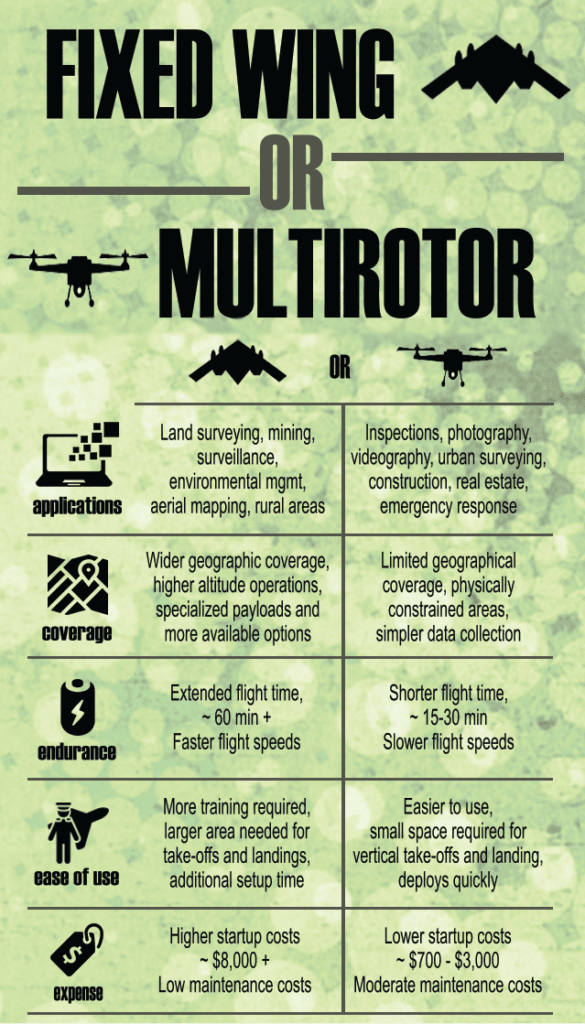Unmanned Systems Source have released an infographic designed to aid the decision-making process when choosing between a multi-rotor or a fixed-wing UAV.
Ultimately, requirements will vary depending on project objectives, operator experience and budget. Below, Unmanned Systems Source have detailed a number of factors that should be considered:
Fixed Wing UAVs
Fixed-wing UAVs are generally better suited for rural environments and are work horses for many commercial and scientific applications. Though they may not offer the manoeuvrability of a multi-rotor UAV, when it comes to flight times and coverage, fixed wing drones excel.
Other advantages include:
- Capability of operating at higher altitudes
- Faster flight speeds
- Power and capacity to carry heavier and, in some cases, multiple payloads – which in turn means the ability to gather more sophisticated data
- Option to choose from a wider variety of sensors
- Extended flight times, 60 minutes +
- Larger coverage.
In regards to the operational area required, it depends on the vehicle. Fixed wing UAVs need more space for takeoffs and landings. While hand-launched models deploy quickly, others require a launching rail.
The initial costs to purchase a fixed-wing system are higher but these systems are fairly inexpensive to maintain due to their simpler design. And there is usually less operational “down-time” for fixed-wing UAVs.
Multi-rotor UAVs
The use of multi-rotor UAVs has exploded in recent years in large part due to their affordability and ease of use. But multi-rotor advantages certainly extend beyond these two points.
Other advantages include:
- Highly manoeuvrable in flight which is great for urban and tightly confined areas
- Ability to hover – which make it an excellent choice for inspections of infrastructure that require close-up examination
- Easy to operate and deploys quickly
- Small takeoff and landing footprint
- Affordable price-point.
In flight, multi-rotor drones are incredibly manoeuvrable and can hover which make them the preferred choice for detailed inspection work and urban areas where space limitations are at a premium. They are also the obvious choice for video and photography work.
Though multi-rotor UAVs provide only limited flight duration (15-20 minutes on average), their operational flexibility makes it a favored choice for many urban applications.
Ultimately, the choice between a multi-rotor or fixed-wing UAV for a specific application depends on a variety of factors. Understanding the strengths and limitations of each vehicle goes a long way in helping inform your decision.
The post Fixed Wing or Multi-Rotor Drone? USS Outlines Key Considerations appeared first on Unmanned Systems Technology.
